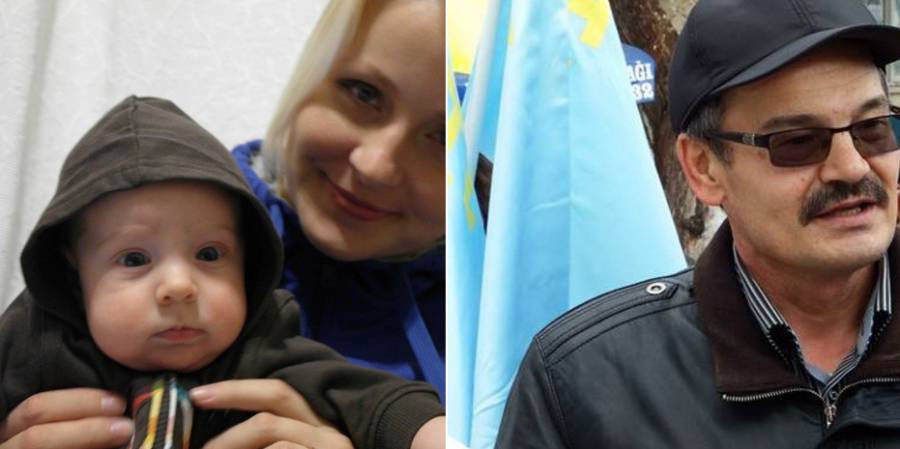Russian teacher jailed for repost exposing child abuse freed, no let-up in persecution for Crimea protest

Yevgenia Chudnovets with her son, Rafis Kashapov
Yevgenia Chudnovets was released from a Sverdlovsk region prison on March 6, after her conviction for supposed ‘circulation of child pornography’ was revoked. This is the second high-profile release following that of Ildar Dadin in late February, however there are no grounds as yet for assuming any let-up in repression. The contrary is the case in Russian-occupied Crimea where arrests, armed searches and general harassment are on the increase. Many other Russians also remain imprisoned, with a number of them persecuted for their criticism of Russia’s annexation of Crimea and military involvement in Ukraine
The revoking of the absurd conviction of Yevgenia Chudnovets on March 6, soon followed with her release from a Sverdlovsk region prison, was widely welcomed. The case had aroused outrage since the kindergarten teacher had been jailed for literally one repost of a video showing a child being tormented in a children’s camp. The video had resulted in police intervention and the eventual imprisonment of two camp officials. Incredibly, however, Chudnovets was also arrested and charged with ‘circulating child pornography’ for reposting the video which she says she did to draw attention to the abuse.
Chudnovets was jailed on Nov 8, 2016 for this one repost on VKontakte of the video showing a child at the Katai children’s camp standing naked, with his back to the camera. Since the staff member on the video was jailed for 3 years and the camp manager for 6, there had obviously been a need to alert the authorities to the abuse taking place. The prosecution had claimed that a single repost which, according to several reports clearly called for an investigation into such treatment of children constituted circulation of child pornography. This was accepted by the first court, and later upheld at appeal stage.
The court ruling came just 5 days after Russia’s own Supreme Court issued an explanation specifically noting that a single ‘like’ or reposting of material on a social network page was not in itself a ‘crime’. The Court stated that the context and all circumstances must be taken into consideration before deciding if a person should be convicted and / or jailed.
There were protests over this conviction, including from Anna Kuznetsova, Russia’s Children’s Ombudsperson and back in November, Russia’s Investigative Committee claimed to be carrying out a check. Then at President Vladimir Putin’s annual press conference, he promised to “pay attention” to the case.
Neither the check, nor the ‘attention’, resulted in more than the appeal court on December 22 reducing the original half-year sentence by one month. The court thankfully did agree that Chudnovets’ 3-year-old could stay with his father and grandmother, rather than being forcibly placed in a children’s home as originally planned.
Chudnovets has effectively served most of the sentence. Her release comes a week after Ildar Dadin’s sentence under a draconian anti-protest law was finally revoked after he had served over half of his 3.5 year sentence.
It remains unclear whether we are seeing a positive trend, or merely imitation. Given the number of political prisoners, including over 40 Ukrainians, a lot more is needed.
For specific persecution in Russian-occupied Crimea, see: 69 children and other compelling reasons for resisting any ’deal’ with Russia on Crimea
The fears that a new article 280.1 of Russia’s criminal code, which came into force in May 2014, would be used against critics of Russia’s annexation of Crimea and military involvement in Donbas have proved justified. Russia has already jailed a number of Russians for so-called ‘public calls to action aimed at violating Russian territorial integrity’ and is currently prosecuting Crimean Tatar leader Ilmi Umerov and Ukrainian journalist Mykola Semena.
The following list of Russians prosecuted and / or jailed under 280.1 or other so-called articles about so-called extremist is unlikely to be comprehensive.
Andrei Bubeev, Russian blogger and father of two small children, is serving a 2.5 year sentence for social network reposts of an article entitled “Crimea is Ukraine” and a picture of a toothpaste tube with the caption “Squeeze Russia out of yourself”
Russian Tatar activist Rafis Kashapov is serving a 3-year sentence for posts on VKontakte criticizing annexation and Russian President Vladimir Putin’s regime (details here)
Darya Polyudova got a 2-year sentence for criticizing the Putin regime and its aggression against Ukraine (details here)
35-year-old Vadim Tyumentsev from Tomsk (in Siberia) was sentenced in December 2015 to 5 years for calls to peaceful protest and critical comments on the Internet regarding Russian military aggression in Ukraine and pro-Russian separatists (details here)
Alexei Moroshkin is being held against his will in a psychiatric hospital, also for criticizing Russia’s aggression against Ukraine (details here)
Yekaterina Vologzheninova was convicted in February 2016 of ‘inciting enmity’ for criticizing Putin’s war against Ukraine. The case had gained huge publicity since she was effectively prosecuted for social networks ‘likes’, and she was sentenced ‘only’ to compulsory labour (details here)
Alexander Byvshev was convicted of ‘inciting enmity’ and sentenced to 300 community labour, thrown off Russian Wikipedia, added to the List of Extremists and Terrorists and dismissed from his teaching posts for poems in support of Ukraine (details here).





